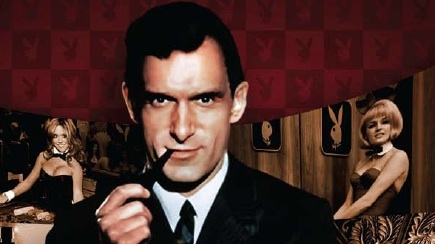This article first appeared in the Nov/Dec 2011 issue of World Gaming magazine.
Playboy is one of the world’s great brands. When we see the golden arches we think of McDonalds, when we see a red can with white cursive writing we know we are drinking coke. When we see that cheeky little bunny wearing a bow tie we know it symbolizes Playboy. Playboy represents different things to different generations and different genders, but the thing that sets Playboy apart from the rest is its incredible success and longevity. The man who invented the brand is almost as recognizable as the brand itself. Not only did Hugh Hefner create that bunny rabbit generations ago, he continues to embody its unapologetic liberalism to this day.

Creator, marketer and enduring figurehead, Hugh Hefner made Playboy what it is today. “Hef”, as he would become affectionately known, has always managed to stay one step ahead of the times. As the decades rolled by he fought battles on the pages of his magazine, in his nightclubs and in the courtroom, but remained stoic when confronted with adversity.
We here at World Gaming magazine love the Playboy brand and what it stands for. As publishers, we also appreciate the sacrifices that Hefner has made for all people who believe in freedom of speech and the fourth estate’s right to print what it sees fit.
We are also big supporters of the Playboy Club Macao at The Sands and have enjoyed its wonderful contribution to Macau’s nightlife. It was through our connection with the Playboy Clubs in Macau and London that we were lucky enough to gain access to the iconic Playboy Mansion, and the chance to interview a living legend.
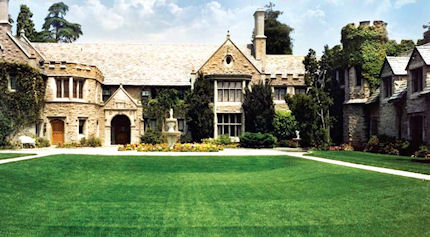
The famous Playboy Mansion
After months of preparations I found myself in Los Angeles, California on a beautiful sunny September afternoon taking the short drive from the boutique Crescent hotel in Beverly Hills to the ultra-luxurious Holmby Hills region of West Los Angeles. After clearing the security gates I was finally ringing the doorbell of the famous six-acre property at 10236 Charing Cross Road. I had to pinch myself – here I was inside the legendary Playboy Mansion, sitting down to ask a few questions of the man who has forged himself into publishing immortality.
Andrew W Scott: Mr Hugh Hefner, thank you so much for allowing World Gaming magazine into your home. Our readers know you well through the Playboy Club in Macau. We party there, we know the bunnies there, our magazine is there and of course we’re based in Macau. I’m sure our readers will be very interested to hear what you have got to say today so thanks for having us here, it is a great honor and a privilege.
Hugh Hefner: It’s a pleasure.
AWS: Let’s start at the beginning. What was your childhood and family like?
HH: Typical mid-Western Methodist American. Conservative, puritan. When I say puritan, I’m literally an 11th generation descendant of William Bradford, who came over on The Mayflower and was the first governor of the Massachusetts Bay Colony, so my puritan roots go deep.
AWS: What were your earliest forays into journalism, even before Playboy? In World War II, I know you were a writer for a military newspaper. How did that come about and did you have any other journalism activities before Playboy?
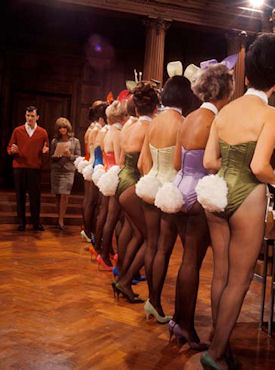
HH: I had always been interested in writing and publishing and cartooning. I did a penny newspaper when I was nine years old, a neighborhood newspaper. I started a school paper called The Pepper when I was in seventh grade, and when I was in service during World War II, drew cartoons for the various camp newspapers I was stationed at. So you know the love of journalism and the dream of starting my own magazine was there from very early on, the only problem with that of course was that I didn’t have any money, but I’m a dreamer and I dreamed impossible dreams and made them come true.
AWS: I know you studied creative writing at the University of Illinois and I can’t imagine at that time you could have possibly had any notion of what would happen in the future.
HH: No (smiles).
AWS: What were those days like? What was your thinking day to day while you were at University?
HH: Well, at one point when I was in college, I worked for the humor magazine Shaft and for The Daily Illini. I drew cartoons for them, and wrote for the humor magazine. I actually wrote an editorial when the first Kinsey report came out in 1948 when I was in college and referred to the Kinsey report as the most important book of the year. So a lot of my interests were there before Playboy. The dreams were there, seemingly impossible, but I was a dreamer and I was in a less than successful, a less than happy marriage. I went to a reunion at Steinmetz High school on the west side of Chicago in December 1952 that rekindled the dreams that were there when I was a teenager, dreams put away when I got married. And in the weeks and months that followed in 1953 I simply started making plans for my own magazine. The only problem was I didn’t have any money, but I got a few friends and relatives to invest a little here and there, I put my own furniture into hock and raised $600 of my own that way. I raised a total investment of $8,000 and on that I was able to launch and put out the very first issue and it was successful immediately. And that was it.
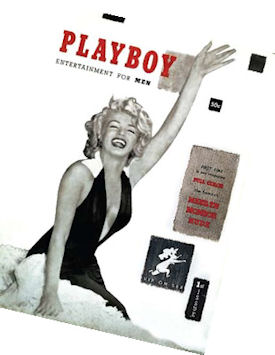
Playboy’s first issue in December 1953, with first-ever playmate Marilyn Monroe
AWS: Being fellow magazine publishers, albeit only in our second year, we’ve followed your career and we’re very interested in your course. You famously had that first undated issue featuring Marilyn Monroe, as you didn’t know whether that there would be a second. All of that has been well documented. What we wonder is what do you remember today about those early years, say ’53, ’54 and ’55? What stands out most in your mind about running that fledgling magazine?
HH: Well, when the very first issues caught on, and the response from the audience was remarkable, I felt that I was very successful from that very first moment, even though I had no money. I couldn’t imagine, of course, what lay ahead. I started the magazine at the very end of ’53, by the end of the decade, by ’59, the magazine was selling over a million copies a month and it passed Esquire, which was the prestige magazine of that time. So in the very first months and years I felt very successful without any real knowledge of the fact that what lay ahead for me was much more than anything I was experiencing then.
AWS: That leads on to my next question. Many brands have come and gone over the decades, but Playboy is this ubiquitous, iconic brand that is instantly recognizable wherever you go in the world. We’re from China, and we go up to small towns in mainland China and they know the Playboy logo. What do you personally believe is the reason behind that incredible success and that brand recognition?
HH: I think that there are certain ideas and brands that are iconic and that have a certain magic to them that outweighs all logic and seizes the imagination of the general public and they become worldwide phenomena and Playboy is the classic example of that, starting with absolutely nothing and changing the very nature of society. Remarkable.
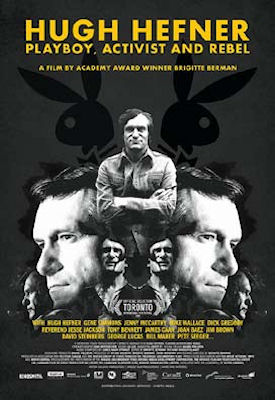
Poster for the movie Hugh Hefner: Playboy, Activist and Rebel
AWS: You have a long history of activism when it wasn’t popular. In the ’50s and ’60s, you were a great supporter of some very then-unpopular causes like gay rights, more liberal drug laws and greater personal freedoms. You stood against racial discrimination. Sitting here today in 2011, obviously we’ve come a long way, do you think there’s a lot further to go or do you think most of those things you strived for through your life have been achieved?
HH: Well, I think that freedom is, you know, an ongoing battle. Democracy, freedom, the things that I believe in, and I think that society should really believe in, require eternal vigilance and I’m happy that I’ve been there for the good fight and I think there are others, who come along behind me, doing the same thing and that’s what it’s all about.
AWS: Well, in our opinion, it’s no exaggeration to say that you’ve been one of the great social influencers of the US in the last few decades and the US probably would not be what it is today without Playboy and the things that you pushed, so, on behalf of all the people on that side of the social agenda, thank you for all those things over the last few decades.
HH: My pleasure (smiles).
AWS: I want to get on to gaming. Our magazine is a gaming magazine and your Playboy Clubs are re-emerging around the world. Obviously there’s the flagship at the Palms in Las Vegas, and we have the one in Macau that we know and love. I was recently at the Playboy club in London, which was formerly the Rendezvous casino, which I remember playing at many years ago. These clubs are starting to re-open around the world and all are associated with gaming. Do you like to bet yourself? And what do you like to bet on, if you do?
HH: Well, I’ve never been a big gambler. I enjoy a game of cards; gin rummy is my favorite card game. I play backgammon, which is probably my favorite game. In terms of casino gaming, I’ve been on both sides of the wheel, and I think the gaming side is the better side, that’s how we build the hotels. But I think it’s a human experience that adds zest to life and I believe in going through life with some style and gaming is part of that.
AWS: So, with the Playboy Clubs reopening, has Playboy embarked upon a new expansion plan? Are there more clubs coming? If so, when might we see them, and what kind of cities might we see them in?
HH: Well I think that Playboy the brand is very clearly in a time of transition. We started simply as a single title magazine. The magazine remains the heart and soul of the company, but increasingly it’s not the most important part of the company. Increasingly, we are in the licensing business. And that means a variety of hugely popular products, both male and female. I just learned yesterday that we are the number three most popular fragrance in Europe. I know that Playboy is a tremendously popular brand in China in men’s clothing. That is our future I think. As you pointed out, there is no other men’s lifestyle brand that is more popular or more universally known around the world, so I think that is the real future of the company, and gaming becomes a major part of that and fits very naturally with the lifestyle.
AWS: Our readers will be upset with me if I don’t ask you a few personal questions. You’ve obviously been married twice and you’ve recently had the girls Holly, Bridget and Kendra here and then more recently the much publicized…
HH: Runaway bride? (laughs)
AWS: Yes, with Crystal. I’ve got to ask you three questions that I’m sure men around the world are wondering. With so many beautiful women around you, why would you consider marriage? Would you ever consider it again after your recent experience? And who are the loves of your life right now?

Photo: Elayne Lodge
AWS: I’d like to get on to the US in general now. The US has been going through a lot of soul searching in the last decade. We started with that terrible tragedy of 9/11, and then we had the Bush years and two wars: Iraq and Afghanistan. The GFC, the collapse of the US dollar, the debt-ceiling crisis – they just seem to keep coming one after the other. Even the great hope of Barack Obama seems to have lost its luster somewhat in the last few years. There are two schools of thought. One school of thought is the US has had its century, and that it’s in a decline that it won’t get out of. Another school of thought is this is just an aberration, there are cycles up and down and the US will return to its former glory. You’ve spent a lot of time watching US society. What do you think is going to happen to the US in the next five, ten, twenty years?
HH: Well, I think we need to more seriously rethink the very nature of our relationship with the world. We can’t continue to police the world and we should not continue to police the world. I think sometimes we do more harm. We are dogooders by our very nature, we are a puritan people, and we’re do-gooders, and we do it for the best possible reasons, in most cases, but it isn’t always seen as that. And sometimes we do more harm than good. As far as I am concerned, the last moral war that America was involved in was World War II. The rest was political foolishness. I think we need to start taking care of business in a more serious way at home.
AWS: Let’s move from one side of the world to the other, to the side of the world that I’m from, China. The 21st century has been described as the Asian century, or more specifically, the Chinese century. We’re seeing enormous growth in China, the fastest growth in the world: 10 percent year on year on year. Macau turnover now exceeds Vegas turnover by 4 to 1, soon to be 5 to 1. Both the Hong Kong and Macau handovers to China are more than 10 years old and no doubt both are resounding successes. What do you think of the rise of China? Do you think that it is a threat to the US? Do you think that China could ever takeover from the US as the world superpower in years to come?
HH: I think it’s possible. I think that it depends what we’re really talking about in terms of whether we’re talking about economics or political power. China is clearly growing in leaps and bounds economically. It really doesn’t have, certainly there’s no real evidence that it has, any real political aspirations in terms of international involvement. So I think that it’s difficult to imagine them replacing America in terms of that kind of political leadership. But I think that we all live on one very small planet and one of the things I think we really need to understand is that people around the world have more in common than things that separate us. We need to learn to live together in rational ways and emphasize the things that really matter to all of us, and that means democracy and freedom and making a better life for everybody.
AWS: Most people have regrets or things they wish had done differently. Looking back with the benefit of hindsight over your undoubtedly amazing life where you’ve achieved so much, does anything stand out to you as something you wish you had done differently?
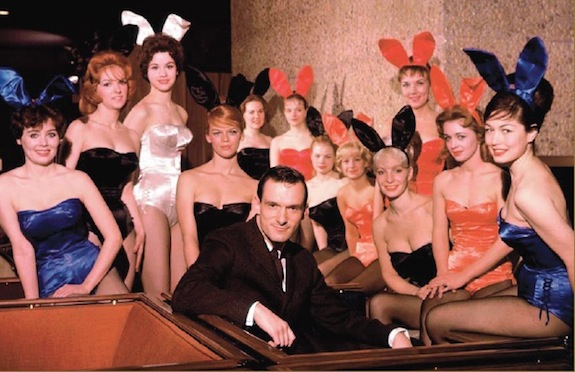
HH: Well, there’s a danger in that. Ray Bradbury, the classic science fiction writer, who did so much work for Playboy, did a piece called “A Sound of Thunder” some years ago that talks about the butterfly effect, in which in a futuristic time travel story, a butterfly is killed in the prehistoric times and it changes everything over the years and centuries and millennia that follow. You change one thing in your life, and you don’t know what impact that may have, and my life has been so blessed on so many levels personal and professional, that I am hesitant to change anything.
AWS: So what’s left for Hugh Hefner to achieve? You mentioned before you are 85, however I have to admit a very young and energetic 85! But you’re at a stage of life where many people are comfortable in their retirements, whereas you are still hard at work producing your magazine, and thank you for sending me a copy every month, it’s very much appreciated! What sort of hopes and dreams and ambitions do you have for the future, personally and professionally?
HH: I think more of the same, enjoying the satisfaction of the place that I am now in my life, reflecting back on wonderful times lived.
AWS: If there was just one thing that Hugh Hefner would like to be remembered for, after you’re gone one day, what would it be?
HH: I’d like to be remembered as somebody who had some significant impact on the social and sexual values of my time. I think I’m secure in that.
AWS: Thank you very much, Mr. Hefner, for spending the time talking to the readers of World Gaming magazine and thank you very much for inviting us here to the Playboy Mansion.
HH: It is my pleasure.

